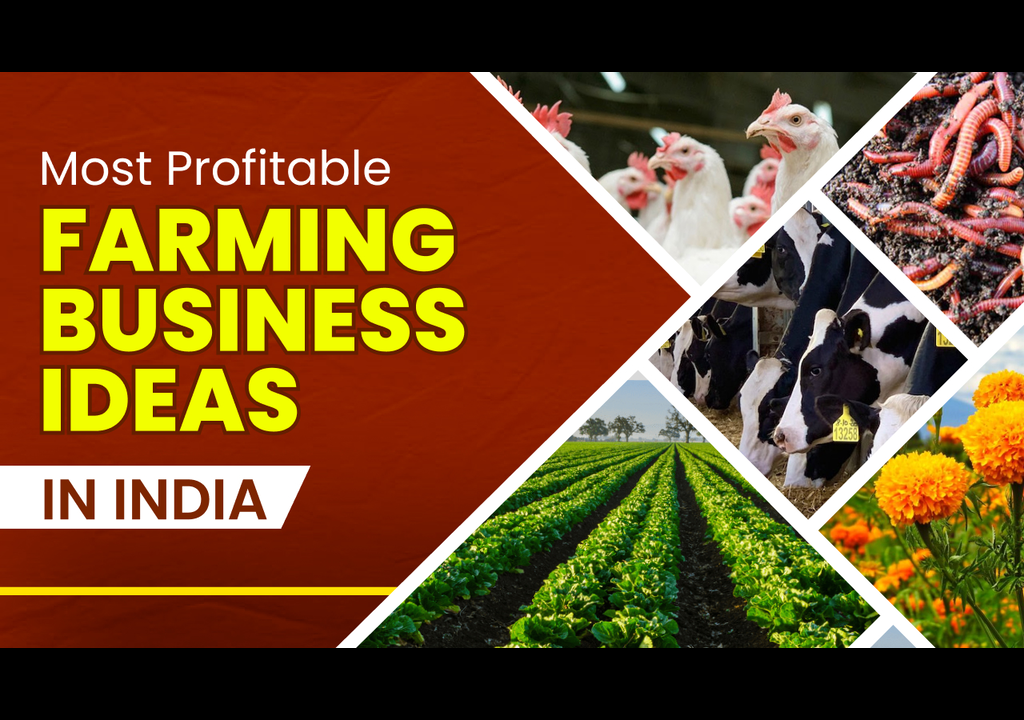
India, often called the ‘Land of Farming’, boasts a rich agricultural heritage with a significant portion of its population farming as a primary or family business. The country’s diverse agro-climatic zones, fertile soil, and abundant natural resources create an ideal environment for various agricultural activities. As agriculture evolves, new opportunities for innovative and sustainable business models are emerging, catering to both domestic and international markets.
In this Blog, we will explore 10 profitable farming business ideas that are gaining popularity and have a high potential for success in India in 2024. These ideas span the entire agricultural value chain, from crop production to value-added products and technology-driven solutions. Agriculture, being the backbone of the Indian economy, contributes significantly to the GDP and employs a large portion of the workforce. With advancements in technology and a growing interest in agribusiness among the youth, the sector is poised for substantial growth. This article aims to highlight the most profitable farming practices in India, offering valuable insights for aspiring entrepreneurs and existing farmers.
Top 10 Most Profitable Farming in India
Below is a detailed list of the most profitable farming business ideas in today’s scenarios.
Organic Farming
Organic farming Business Ideas has emerged as a leading agribusiness in India due to its emphasis on sustainable practices and health-conscious consumer preferences. By eschewing synthetic chemicals and focusing on natural fertilizers and pest control methods, organic farming produces eco-friendly, nutrient-rich crops. This approach not only preserves soil fertility but also promotes biodiversity and reduces environmental pollution. In a country with a rich agricultural heritage like India, organic farming aligns with traditional farming practices while catering to a growing global market for organic produce. Its high demand is driven by health-conscious consumers seeking safe, pesticide-free food options, making it a most profitable farming in India and sustainable choice for farmers nationwide.
Basic Structural Requirements: Certified organic seeds, natural fertilizers, composting units, crop rotation plans.
Financial Requirements: Initial investment for seeds, composting equipment, and certification can range from ₹50,000 to ₹2,00,000.
Approx Profit: ₹1,00,000 to ₹5,00,000 annually, depending on scale and market.
The below table mentions the most profitable farming in India as well as some of the most profitable farming crops in India.
| Name of the Crop | Yield in kgs (1 Acres) | Expected Profit (in ₹) |
| Amaranthus | 2000 bunches | 20000 |
| Palak | 1000 bunches | 10000 |
| Chilli | 7000 | 175000 |
| Brinjal | 6500 | 125000 |
| Cauliflower | 550 | 105000 |
Dairy Farming
Dairy farming holds a prominent position in India’s agribusiness landscape due to its multifaceted contributions and economic significance. It involves the systematic rearing of cattle, primarily cows and buffaloes, for milk production, which serves as a vital source of nutrition and livelihood for millions. The industry’s resilience lies in its ability to cater to diverse market demands, supplying raw milk for consumption and processing into various dairy products like ghee, butter, and yogurt. Dairy farming not only supports rural economies by generating employment but also enhances food security by providing a reliable source of protein-rich dairy products essential for a balanced diet.
Basic Structural Requirements: Sheltered barns, milking machines, feed storage, and cooling units.
Financial Requirements: Starting investment for livestock, shelter, and equipment can be between ₹5,00,000 to ₹10,00,000.
Approx Profit: ₹2,00,000 to ₹6,00,000 annually, depending on herd size and milk yield.
Poultry Farming
Poultry farming is a leading agribusiness in India because it meets the high demand for chicken meat and eggs. It’s popular because it doesn’t need huge investments initially, so many small farmers can start. Poultry farming works well in different climates and brings quick profits. New techniques and better ways to prevent diseases help farmers produce more chickens and eggs. This means there’s always enough affordable chicken and eggs for everyone, making poultry farming crucial for India’s food supply and economy.
Basic Structural Requirements: Chicken coops, feeding systems, incubation and brooding equipment.
Financial Requirements: Initial setup costs can range from ₹1,00,000 to ₹3,00,000.
Approx Profit: ₹1,50,000 to ₹4,00,000 annually, depending on the number of birds and market conditions.
Goat Farming
Goat farming Business Ideas is popular in India because it’s affordable and doesn’t need a lot of investment to start. Goats give milk, meat, and even wool, so they’re versatile for earning. They can live in many different places and climates, which makes them suitable all over India. Goat farming also doesn’t require too much work compared to other types of farming. Farmers can start making income relatively quickly. These reasons make goat farming a great choice for farmers who want a profitable business that’s also easy to manage.
Basic Structural Requirements: Goat sheds, grazing land, feeding and watering systems.
Financial Requirements: Initial costs for goats, shelter, and feed can be around ₹2,00,000 to ₹4,00,000.
Approx Profit: ₹1,00,000 to ₹3,00,000 annually, based on herd size and product sales.
Beekeeping
Honey is the primary product of beekeeping, serving as a valuable natural sweetener and an essential ingredient in various culinary and medicinal applications. It is cherished globally for its unique flavor profiles, nutritional benefits, and therapeutic properties. Beekeepers harvest honey by carefully managing bee colonies and extracting the honeycombs. This process involves maintaining the health of the bees, ensuring optimal conditions for honey production, and adhering to sustainable practices to preserve bee populations. Honey stands as a testament to the intricate relationship between humans and bees, providing not only economic benefits but also promoting biodiversity and ecosystem health.
Basic Structural Requirements: Beehives, protective gear, honey extractors.
Financial Requirements: Startup costs for hives, bees, and equipment can range from ₹50,000 to ₹1,50,000.
Approx Profit: ₹1,00,000 to ₹3,00,000 annually, depending on hive number and honey yield.
Mushroom Farming
Mushroom farming has become a top agribusiness in India due to its profitability and growing market demand. This cultivation of edible fungi is prized for its high nutritional value and versatile culinary uses, making it popular in both domestic and international markets. Mushroom farming requires relatively low initial investment and resources compared to traditional crops or livestock, appealing to entrepreneurs and farmers seeking sustainable yet profitable ventures. The controlled environment needed for mushroom cultivation allows for year-round production, ensuring consistent income. Moreover, mushrooms are rich in protein, vitamins, and minerals, aligning with the increasing consumer preference for healthy and organic foods, further boosting its marketability.
Basic Structural Requirements: Controlled environment chambers, spawn, substrate, and humidifiers.
Financial Requirements: Initial investment for setup and materials can be between ₹1,00,000 to ₹3,00,000.
Approx Profit: ₹2,00,000 to ₹5,00,000 annually, depending on production scale.
Aquaculture
This farming practice involves the breeding and cultivation of aquatic organisms such as fish, shrimp, and mollusks in controlled environments like ponds or tanks. It provides a reliable source of protein-rich food, crucial for dietary diversity and nutritional security. Aquaculture’s scalability, high productivity per unit area, and year-round production capability make it economically viable. Moreover, it promotes employment in rural areas and supports coastal communities, contributing significantly to India’s food security and economic growth while conserving wild fish stocks.
Basic Structural Requirements: Ponds or tanks, aeration systems, feeding systems.
Financial Requirements: Initial setup costs can range from ₹3,00,000 to ₹8,00,000.
Approx Profit: ₹2,00,000 to ₹6,00,000 annually, depending on the type of aquatic species and market.
Medicinal Plants Farming
Cultivating medicinal plants offers sustainable income opportunities while contributing to healthcare and pharmaceutical industries. India’s rich biodiversity and favorable climatic conditions support the cultivation of diverse medicinal species, attracting both traditional healers and modern pharmaceutical companies. This sector not only preserves indigenous knowledge but also promotes eco-friendly farming practices. With increasing awareness of natural therapies and the rising preference for organic products worldwide, medicinal plants farming holds promise for significant economic growth and societal health improvements in India.
Basic Structural Requirements: Fertile land, irrigation systems, drying and storage facilities.
Financial Requirements: Initial costs for seeds, land preparation, organic inputs and irrigation can range from ₹1,00,000 to ₹3,00,000.
Approx Profit: ₹2,00,000 to ₹5,00,000 annually, based on plant type and market demand.
Spice Processing and Packaging
Spice processing and packaging is gaining prominence in India due to its vital role in adding value to agricultural produce. It involves cleaning, drying, grinding, and packing spices like turmeric, chili, and cumin for retail and wholesale markets. This sector benefits from India’s rich spice cultivation heritage and global demand for quality spices.
Basic Structural Requirements: Processing units, drying facilities, grinding machinery, packaging materials, and storage areas.
Financial Requirements: Initial investments range from ₹3,00,000 to ₹8,00,000 for equipment and setup.
Approx Profit: Profit margins can vary widely, with potential annual earnings ranging from ₹4,00,000 to ₹10,00,000 depending on production capacity and market reach.
Hydroponics
Hydroponics is becoming a top agribusiness in India because it grows plants without soil. Instead, it uses water with nutrients to feed plants directly. This method saves water and land, making it perfect for cities where space is limited. It’s also very precise in giving plants exactly what they need to grow well. This type of farming produces.
Basic Structural Requirements: Hydroponic systems, nutrient solutions, grow lights, and controlled environment facilities.
Financial Requirements: Initial setup costs for equipment and materials can range from ₹2,00,000 to ₹5,00,000.
Approx Profit: ₹3,00,000 to ₹7,00,000 annually, depending on crop type and production scale.
How To Start an Agriculture Business In India?
Here’s a step-by-step guide to help you begin:
- Research and Planning: Start with thorough research on the types of farming suitable for your region, market demand, and current trends in agriculture. Create a detailed business plan outlining your goals, budget, and strategies for crop selection, land acquisition, and marketing.
- Choose the Right Crop or Livestock: Decide on the most profitable crops or livestock based on your location, soil type, and climate. Consider high-demand products like organic vegetables, medicinal plants, or dairy farming.
- Secure Funding: Look for funding options such as government schemes, bank loans, or private investors. Many banks and financial institutions offer agricultural loans with favorable terms for farmers.
- Acquire Land and Equipment: Purchase or lease suitable farmland. Invest in modern farming equipment and technology to enhance productivity and efficiency.
- Get Necessary Permissions: Ensure you have all the required licenses and permits. This includes land documents, environmental clearances, and health and safety regulations.
- Implement Sustainable Practices: Adopt sustainable farming practices to conserve resources and protect the environment. Techniques like organic farming, drip irrigation, and integrated pest management can boost your yields and reduce costs.
- Marketing and Sales Strategy: Develop a strong marketing plan to reach your target customers. Utilize online platforms, local markets, and agricultural fairs to promote your products. Build relationships with buyers and explore export opportunities.
- Join Farmer Cooperatives and Networks: Being part of farmer cooperatives or networks can provide you with support, knowledge exchange, and better market access.
The agriculture business in India requires dedication, planning, and the right resources. With the right approach, you can tap into the vast potential of India’s agricultural sector and build a successful farming enterprise.
The Help You Can Get From the Indian Government To Start An Agri-Business
Starting an agriculture business in India can be supported by various government schemes and initiatives aimed at boosting rural entrepreneurship and agricultural productivity. The Indian government provides substantial help through financial assistance, subsidies, and technical support to encourage individuals and groups to venture into agriculture.
Below are some schemes where you can start your farming business ideas:
- Pradhan Mantri Krishi Sinchai Yojana (PMKSY) :
- Rashtriya Krishi Vikas Yojana (RKVY)
- National Mission for Sustainable Agriculture (NMSA)
Conclusion
- Profitable farming business ideas in India demonstrate viable business opportunities.
- Methods like organic farming and hydroponics cater to diverse consumer needs and promote environmental sustainability.
- Farmers and entrepreneurs can earn significant profits while contributing to food security and rural development.
- These farming practices are scalable, accommodating both small and large agricultural operations.
- Implementing these ideas ensures a sustainable and prosperous future for Indian agriculture.
FAQs
Dairy farming is considered one of the most profitable farming business Ideas in India due to its multifaceted contributions to the economy and consistent demand for dairy products.
Apart from organic farming, hydroponics is another highly profitable agribusiness due to its efficient use of resources and the growing demand for fresh, high-quality produce.
Organic farming is the best business for farmers due to its high demand, sustainability, and profitability.



